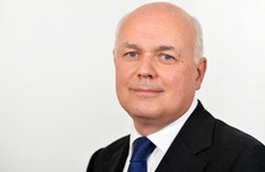Planned changes to sickness benefits to encourage more people to work
Secretary for Work and Pensions Iain Duncan Smith has revealed plans to ‘shake-up’ the current rules for sickness benefits to encourage more people to work where possible.
Describing the current system as too ‘binary’, with many claimants labelled fit or unfit for work, Mr Duncan Smith said a new system could see claimants be supported to do any work they can, even if just for a few hours.

Stressing the importance of personalising assessments, he said: “It is right that we look at how the system supports people who are sick. A system focused on what a claimant can do and the support they'll need, and not just on what they can’t.”
Speaking about Mr Duncan Smith’s announcement of changes to the Employment and Support Allowance, including reforms of the ‘fit-for-work’ test (Work Capability Assessment), campaigns director at Leonard Cheshire Disability, Andy Cole, said: “Any measures that support disabled people into work are welcome. The Government’s pledge to halve the disability employment gap over this Parliament will mean more than a million disabled people will be better off. It is vital that any changes actively help those who are able to work find meaningful employment, but ensure that those who are not, are given the time they need to recover without worrying about cuts to their financial support.
“The fit-for-work test is not working for disabled people. Too often those who are too ill to work are wrongly being found fit to do so. And our own research found that as many as 7 in 10 people going through the assessments said it had a negative impact on their health. We would welcome working with the Government to ensure that any new assessment provides a better experience for disabled people.”
During the announcement, Mr Duncan Smith maintained that the ‘most vulnerable people’ in society would be protected under new reforms and supported the plans by stating that the UK spends more on sick and disabled people than the average amount spent by other nations within the Organisation for Economic Co-operation and Development (OECD).
Mr Duncan Smith’s speech focused on the Employment Support Allowance, paid to those who are unable to work due to health reasons; those who receive the benefit have their fitness to work tested using the Work Capability Assessment. He added: “Nearly 11 million adults in the UK have a common mental health condition and people are much more likely to fall out of work if they do.
“We also know that being out of work for four weeks or more can actually effect people’s mental health, even if the original reason for ill health was a physical one.”
Director of external relations for Mind, Sophie Corlett, said: “We would welcome any move by the Department for Work and Pensions (DWP) to genuinely improve the support given to help people with mental health problems back to work.
“The current system is failing this group, with only about 8 per cent of people who are supported by the benefit Employment and Support Allowance (ESA) being helped into work through the Government’s flagship Work Programme. We’ve long been calling for a complete overhaul of the system to take into account and address the barriers that people with mental health problems face in getting into and staying in jobs.
“What people need is support. What they don’t need is more pressure and sanctions. Threatening to punish people by cutting their benefits when they fail to do certain mandatory activities has a negative effect on people’s mental health, and actually pushes people further from work; it is hugely counterproductive.
“We have been calling on the DWP to address these issues for a number of years and will be keen to work with Ministers to improve the support available, but only if they are serious about making the huge changes necessary to fix this broken system. They need to listen to the challenges people with mental health problems face in finding and retaining work, and create support that helps to overcome these challenges, rather than simply placing more pressure on people to find work.”
Latest News
 29-Jul-24
Dementia Bus gives carehome.co.uk staff insight into life with dementia
29-Jul-24
Dementia Bus gives carehome.co.uk staff insight into life with dementia
 27-Jul-23
UK's top home care agencies in 2023 revealed
27-Jul-23
UK's top home care agencies in 2023 revealed
 30-Nov-22
A quarter of older people keep their falls secret from family
30-Nov-22
A quarter of older people keep their falls secret from family
 29-Nov-22
'Covid-19 has not gone away' say terminally ill
29-Nov-22
'Covid-19 has not gone away' say terminally ill
 28-Nov-22
IT consultant who received poor care opens 'compassionate' home care business
28-Nov-22
IT consultant who received poor care opens 'compassionate' home care business